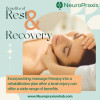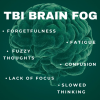Mindfulness means to mentally be in the “here and now,” focusing on the present moment without distracting yourself from thoughts of the future and past. As a result, practicing mindfulness allows you to take a step back and pay attention to your current thoughts, feelings, and behaviors. It is easy to get carried away and lose sight of appreciating the moments in our lives when overwhelmed by stressors and the demands that are placed on us. Mindfulness is one of the most convenient coping strategies we can engage in, yet it is not incorporated enough into our daily routines, or at all, and can be easily overlooked. It has multiple benefits on our well-being such as decreasing anxiety, stress, and chronic pain. Furthermore, it has been shown to increase our state of relaxation and have a more positive outlook on our lives and relationships.
Mindfulness and Brain Injuries
After a brain injury individuals may experience cognitive problems with initiation and concentration, difficulties balancing their activities with rest, and experience new physical changes, making it difficult to successfully engage the activities they use to participate in. Studies have shown mindfulness-based treatment sessions to have benefits on neurological conditions such as TBI, stroke and multiple sclerosis in reducing fatigue that is manifested either physically or mentally. Mindfulness has also been shown to improve the health status, performance, and satisfaction in activities for individuals with a brain injury secondary to improving cognition, quality of life, and mental fatigue when combined with gentle aerobic exercises. Medication, a form of mindfulness, can have positive benefits for an individual with TBI’s attention, memory, executive functioning, and improve their moods. One of mindfulness’ principles is practicing acceptance, which could be contributing factor for the positive effects for the TBI population, particularly individuals with a negative self-image after their incident.
Below listed are mindfulness quotes and strategies that may be helpful.
| Mindfulness Quotes | Mindfulness Strategies
|
-Thích Nhất Hạnh
|
|
References
Ulrichsen, K. M., Kaufmann, T., Dørum, E. S., Kolskår, K. K., Richard, G., Alnæs, D., Arneberg, T. J., Westlye, L. T., & Nordvik, J. E. (2016). Clinical Utility of Mindfulness Training in the Treatment of Fatigue After Stroke, Traumatic Brain Injury and Multiple Sclerosis: A Systematic Literature Review and Meta-analysis. Frontiers in psychology, 7, 912. https://doi.org/10.3389/fpsyg.2016.00912
Lilliecreutz, E. K., Felixson, B., Lundqvist, A., & Samuelsson, K. (2017). Effects of guided aerobic exercise and mindfulness after acquired brain injury: a pilot study. European Journal of Physiotherapy,19(4),229–236.
https://doi-org.westcoastuniversity.idm.oclc.org/10.1080/21679169.2017.1337220
Human Performance Resource Center, Uniformed Services University of the Health Sciences. (2019). Can meditation help after brain injury? BrainLine. https://www.brainline.org/article/can-meditation-help-after-brain-injury



